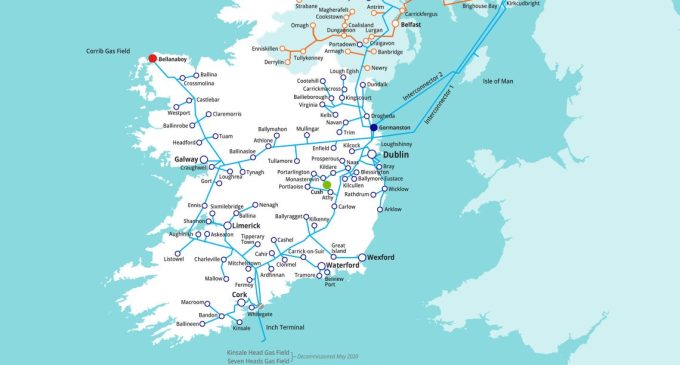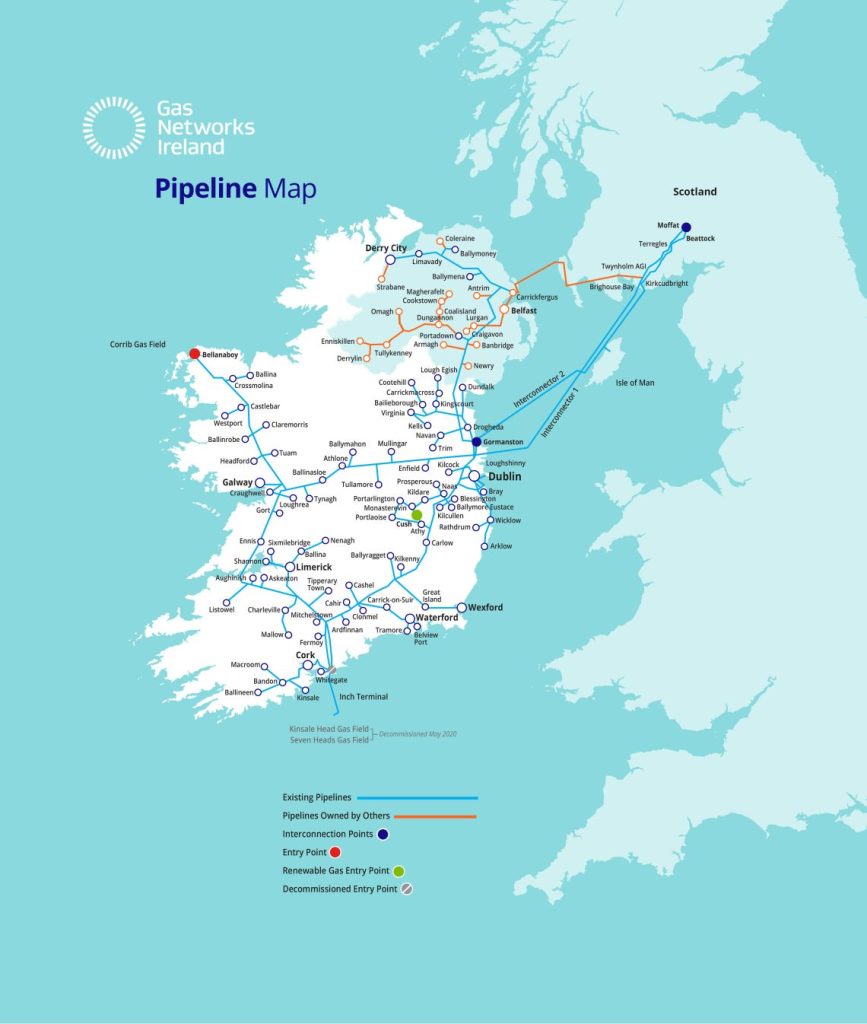Consultation launched on Ireland’s gas infrastructure

The Commission for Regulation of Utilities (CRU) has launched a consultation on Gas Networks Ireland’s Development Plan as critical infrastructure programme ramps up, writes David Keniry.
The CRU has a Consultation Paper on proposed Ten-year Network Development Plan (TYNDP) 2023 along with the draft TYNDP. The CRU is interested in the views of actual and potential users of the system regarding the Gas Network Ireland’s (GNI) Ten-year Network Development Plan (TYNDP) 2023.
Following the consultation, the CRU will request GNI to fully consider all comments and suggestions submitted as part of the consultation before submitting the final TYNDP to the CRU for approval. The deadline for submitting responses is 3 May 2024.
The TYNDP presents the the Transmission System Operator’s view as to the future gas supply and demand in Ireland, system operation and capital investment that may be required over the next decade. The TYNDP highlights that Ireland’s transmission system is forecasted to have sufficient capacity to meet future gas flow requirements over the ten-year horizon in the TYNDP, subject to the successful completion of capacity upgrade works at both compressor stations in Scotland, Brighouse Bay and Beattock.
The forecast demand across the power generation, industrial and commercial, residential and transport sectors is shown in their Low, Best Estimate and High demand scenarios. The Best Estimate scenario predicts a 21% reduction in annual demand between 2022/23 and 2031/32 with gas demand expected to peak in 2025/26. While gas demand is expected to decline in this period (2022/23 to 2031/32), as per the TYNDP, electricity demand is predicted to increase by 43% across the forecast period, this is driven by the expected significant uptake and penetration of renewable electricity generation and the electrification of residential heating.
The interconnection point at Moffat will remain an important source of gas supply and is expected to provide 73.3%8 of annual Republic of Ireland demand at the end of this time period.
While supply from the Corrib gas field is expected to decrease over the next ten years this is anticipated to be offset by renewable gasses with increased levels of biomethane, and hydrogen, expected to be included as part of supply. With regard to peak day demand in the long-term Moffat is anticipated to meet 90.8% of ROI peak day demand in 2031/32, with Corrib contributing 3.4%, and hydrogen and biomethane making up the rest of the supply.
Although overall demand is expected to fall, the 1-in-50 and average peak day gas demand for the Republic of Ireland are both expected to increase during the forecast period. For the 1-in-50 peak demand, an 18% and 57% increase in the best estimate and high gas demand scenarios is expected for the period 2022/23 to 2031/32 (a decrease of 14% is expected in the low gas demand scenario). Similar increases are expected in the average ROI peak day gas demand of 22% and 58% in the best estimate and high gas demand scenarios for the period 2022/23 to 2031/32 (a decrease of 11% is expected in the low gas demand scenario).
This increase in peak demand is influenced by the increase in electricity demand over the study period, coupled with limited wind generation availability during cold weather peak demand periods, and the resultant dependency on thermal generation to meet demand in such situations.
The plan notes that the gas network could be fully decarbonised through the injection and transportation of biomethane and hydrogen beyond 2030. Although GNI also note that for this to be possible, the gas and electricity networks would need to be further integrated.
To support the consultation process and the development of a robust TYNDP, the CRU has posed the consultation questions that respondents may use as a basis for their review including:
Does the report sufficiently demonstrate the adequacy of the gas transmission system and security of supply?
Does the report provide sufficient clarity on infrastructure development, future investments and timeframes for such projects?
GNI’s Plan is primarily focused on security of supply and forecasting demand and supply as per the relevant legislation. The legislative landscape has evolved with the Climate Action and Low Carbon Development Act and the introduction of Sectoral Emissions Ceilings. With that in mind the CRU wish to include some specific questions on these areas, as follows:
The Government’s Energy Security in Ireland to 2030 package was published in November 2023 which was just before the policy data freeze date of December 2023 and limited time was available for a detailed assessment of the relevant actions. There are key actions that are relevant to GNI, including those specifically related to the Resilience Work Programme for Gas.
Do consultee respondents have a view of how these actions could be addressed in future iterations of the TYNDP?
The Government’s Energy Security in Ireland to 2030 package states that Ireland imports approximately three quarters of its gas from the UK and this is expected to increase as indigenous supply from the Corrib gas field declines. Demand for gas is expected to temporarily increase in the coming years as Ireland ceases its use of coal and peat for power generation. The peak day demand for gas is expected to rise, as gas plays a back-up role to an electricity system with increased demand, dominated by variable renewable generation.
The technical analysis shows that the existing infrastructure and supply sources are largely able to meet Ireland’s gas demand requirements in the medium- to long-term. It also shows, however, that a disruption of gas supplies from the UK, for whatever reason, would have a very significant impact on Ireland’s economic and social well-being.
In considering future changes to Ireland’s natural gas demand, supply and infrastructure it lends itself towards a two-part approach with ‘permanent’ and ‘temporary’ measures required to address risks to unmet demand should a disruption to supplies occur. ‘Permanent’ measures, consistent with developing an integrated carbon neutral energy system will take longer to develop and implement to full effect.
In the intervening period, it is proposed to introduce temporary measure to address any unmet demand should a significant disruption occur to Ireland’s largest gas infrastructure and ensure Ireland complies with EU legislative requirements on gas security of supply.
The analysis shows that Ireland needs to enhance its resilience in the event of a disruption to the country’s natural gas supplies. A disruption to Ireland’s supplies of gas is considered to be an unlikely, but high impact event. Without implementing new additional resilience measures, a disruption would lead to unacceptably high economic and social costs. Action 17 seeks to address this through implementation of a Strategic Gas Emergency Reserve. In line with the Government decision to develop a state-led Strategic Gas Emergency Reserve, and as a final part of the review of Ireland’s energy security, the Department of Environment, Climate and Communications, in consultation with the gas transmission system operator (GNI), will complete a detailed examination of the optimal approach to deliver the emergency gas reserve. The Minister will return to Government for a final decision in Q2 of 2024. State-led means commissioned by the State via GNI within a regulatory framework overseen by CRU.
This does not preclude a public-private partnership nor the involvement of private firms contracted to provide, build, or operate the necessary infrastructure.
Reducing gas demand and increasing renewable gas production will reduce Ireland’s risk significantly, but the risks are expected to remain for at least a decade. The existing policy on natural gas is not adequate to address these risk.
Based on preliminary analysis of the Department, it is anticipated that a floating reserve (FSRU)
will best meet these criteria. However, this will be examined in detail by GNI with a substantive proposal by Q2 2024 . The optimum solution to deliver this strategic reserve project will be subject to final approval by Government. The Department will also continue to liaise with CRU and the European Commission to ensure appropriate regulatory compliance.
Last week, GNI issued a request for information for the provision of Engineering Services Framework Agreement. Prior to this competitive procurement process GNI wishes to take market soundings from interested market operators service providers, suppliers and individuals to identify capabilities, service cost factors and general market dynamics through this Request for Information (RFI) process.
The provision of The Engineering Design Services Framework is envisaged to have six (6) lots. Each lot is descripted in the RFI, these are the lots and scope which GNI and GNI trading as Aurora Telecom is currently planning to tender for services in the Republic of Ireland including:
Lot 1: Refurbishment & New Build Assets for Transmission Onshore and Offshore
Lot 2: Network Modifications, Refurbishment, Reinforcement, New Connections for Transmission and Distribution
Lot 3: Biomethane, Hydrogen, District Heating and Renewable Gas New Build
Lot 4: Environmental and Planning
Lot 5: Electrical, Control & Instrumentation
Lot 6: Design & Cost Estimation of New Connection Projects & Mains Alteration Projects
Responses are requested to be submitted by April 12th.
GNI is also searching for a new cohort to join its Apprenticeship Programme commencing this October. The four-year programme provides mentor-led apprenticeships working on Ireland’s €2.8bn, 14,725km national gas network. The newly appointed apprentices will help to maintain and operate Ireland’s national gas infrastructure trusted by 720,000 Irish customers to provide efficient and reliable energy to meet their heating, cooking, transport and manufacturing needs. This includes installation, inspection, and testing of a wide range of systems, such as pipework, gas metres and pressure regulators.
During the mechanical course the apprentices will gain competency in a range of industrial skills, such as welding, turning and fabrication while electrical apprentices will learn about the installation and maintenance of wiring systems and calibration of sensors, among other skills. In the plumbing programme, apprentices receive comprehensive training in pipework systems, welding, soldering, and gas meter installation and maintenance.
Facilitated in partnership with SOLAS, apprentices receive on-site training with Gas Networks Ireland technical training coaches and attend formal classes in the Educational Training Boards and associated Technological University, alongside mentoring and coaching from our employees with unrivalled experience in the gas industry.
On completion of the Apprenticeship Programme, successful trainees will be awarded a QQI Level 6 Advanced Certificate Craft – the national and international requirement for craftsperson status. Online applications close 30th April 2024.
Meanwhile, GNI has announced a landmark development of gas infrastructure to connect Bord na Móna’s Edenderry Renewable Energy Complex to the national gas network. The grid connection will enable the integration of both natural gas and renewable gas including biomethane and green hydrogen, into the fuel mix at the Co. Offaly renewable energy complex.
On completion, the transmission connection project will immediately facilitate a reduction of approximately 40% in CO₂ emissions at the County Offaly energy complex which supports the national energy grid in times of high demand – providing 116MW of electricity to help balance the intermittency of supply from other energy sources in the country.
This investment will see the construction of a steel transmission pipeline, approximately 22Km in length, that will connect Bord na Móna’s renewable energy complex in Edenderry, to Ireland’s €2.8bn gas network. Initially the project will facilitate the transmission of natural gas, with a shift to renewable gases over time.

The Transmission Connection project is currently in its preliminary planning and development phase, with construction expected to start in 2027 and the pipeline anticipated to be fully operational in 2029. GNI intends to engage local communities and host public information evenings over the coming weeks to share more details about the project and its benefits.
Emphasising the significance of the partnership, GNI’s newly appointed Director of Assets & Infrastructure, Brian Sheehan said:
“The gas network plays a critical role in Ireland’s energy landscape, and this connection for Bord na Móna marks a significant step towards a greener future.
“The gas network can be adapted to transport zero-carbon gases, such as green hydrogen. It has already transformed once, from carrying town gas to natural gas over 40 years ago, and more recently adapted to biomethane when it was first introduced onto the Irish network in 2019.
“Gas Networks Ireland is fully committed to this strategic infrastructure development project and has assembled a dedicated team to ensure its success.”
John Reilly, Head of Renewable Energy at Bord na Móna commented:
“We are delighted to announce this partnership with Gas Networks Ireland which will have a transformative effect on our Edenderry Renewable Energy Complex – enabling us to decarbonise our existing infrastructure by approximately 40% once the transmission connection is complete and natural gas is fully incorporated into our fuel mix. The project will facilitate the transmission of natural gas in the immediate term with an opportunity to shift to renewable gases like green hydrogen and biomethane in the future.
“Our existing diesel generation assets located at the Edenderry Renewable Energy Complex play a key role in supplying 116MW of electricity to the national energy grid during periods of high demand when solar and wind energy availability is limited, and this development will ensure these generation assets are operating even more sustainably, as one of the largest on-demand renewable electricity generators in Ireland.”
The third Power and Energy Conference will take place in Waterford on June 13th. For more information, click here.








